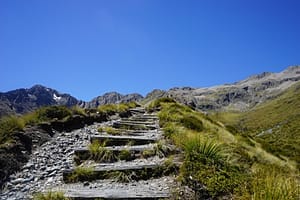 by John Aitken
by John Aitken
Internationally, New Zealand seems to be a desired destination. We have a thriving tourist industry, tempting tourists with a multitude of ways to place their lives in danger. Unfortunately, there is not the same attraction for career scientists, partly because of funding and partly because of remoteness from the centres of international research excellence. The adventurous spirit seems to be implanted in our genes. When I was young, I was a member of the New Zealand Boy Scout movement and was well trained in the ability to avoid death in the mountains by the time I was 15.
As a Scout, I had frequent expeditions into the wilderness, usually in a small team of others near my age. I learned the value of working in a team to achieve a goal. One person in the team was better at rock climbing, another at crossing rivers. There were always a couple of fellow adventurers to help carry you out if you ended up as a “walking wounded.”
For some unknown reason, the flora of New Zealand contains plants and organisms capable of producing antibiotics. Even today, I occasionally slip away to the National Park, with tent and pack, looking for specimens of native plants to examine for antibacterial activity. At least that is the excuse I use for a pleasant weekend up a river valley!
New Zealand is not ideally placed to carry out research. My company, Otakaro Pathways, is fortunate in that the majority of the directors are Medical Laboratory Scientists and maintain good collegial relationships with other scientists. We also have a good working relationship with the Canterbury District Health Board, who provide us with a space to work in and access to the excellent scientific experience and technology within their organization. All of this is to point out that we still operate as teams. The teams today, however, are more diffuse and depend on reliable technical and scientific support, rather than support when climbing a mountain.
Within New Zealand there are areas of excellence for the work we do. These are contained mainly within the publicly owned medical laboratories and the Universities. Because of “restructuring” and “efficiency” over the years, the staff of these institutions are mainly late middle age, and there is some concern about what will happen when the institutional knowledge contained within these grey heads decides to retire. We are not so constrained in the private sector, so we are in a position to find and mentor young scientists who are keenly interested in the research path, without the restrictions of publicly funded research.
In the public sector there are constraints. The first is lack of money –no surprises there. Another issue is the tendency of government to only fund research that casts the government in a kindly light. New Zealand has one of the highest rates of Crohn’s disease in the world, and our main export is dairy products. Some of the latest Crohn’s disease research seeks to define the role of a pathogenic Mycobacterium species found in pasteurized milk. Clearly this is not an ideal situation for either the patients or the researchers when seeking governmental support. However, this is slowly changing as the country realizes that we must build new international markets by using intellectual and innovative strengths.
Internationally, research funding is affected by different problems. Crohn’s disease does not have a high profile in the public mind, despite the growing spread of the illness. The link between the food supply and Crohn’s disease makes financial support elusive. Another barrier we have faced in my city, Christchurch, is the earthquake of four years ago. Infrastructure was severely damaged. Only recently has the city climbed into a sustained recovery mode. For Otakaro Pathways, this translated to a loss of buildings and opportunities as some of our energies were spent on more immediate concerns.
Lord Ernest Rutherford, the man who first split the atom, was a New Zealander. His first laboratory was in Christchurch, and was recently excavated when the earthquake repairs were being carried out. Lord Rutherford is considered one of the great science experimenters in the world. Like most scientists in New Zealand, when offered the opportunity, he hopped down the brain drain and headed overseas to continue his research. Lord Rutherford was a strong believer in experiments –the most difficult area of science for which to find funding. There is, however, an upside to having no money, as he once observed: “We’ve got no money, so we shall have to think.”
The most cost-effective way to advance in research is to form teams. We operate virtual teams in our research. We don’t try to do everything ourselves, but we keep it within the team. The team to which I belong includes colleagues from Bulgaria, the United States, Australia and within New Zealand. In itself, this team is somewhat of a miracle. No one has any money, but the fuel is passion for scientific discovery and the desire to defeat a cruel illness. My colleagues have complementary abilities in clinical settings, research, bacteriology and molecular biochemistry. It is a great privilege to be part of this team. They are truly outstanding, and the last four years have been the most challenging and energizing of my career. It is never boring!
I think the founder of the New Zealand Scout movement, Lord Baden-Powell, would be pleased to see his concept of a team extended into the 21st century. He once observed: “Life without adventure would be deadly dull.”
